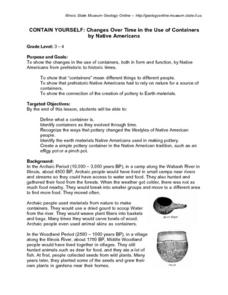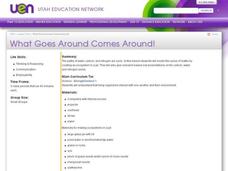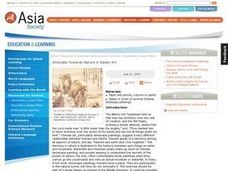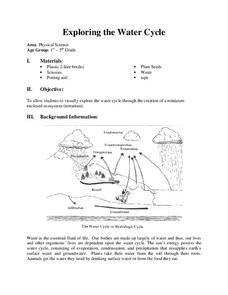Ask a Biologist
It’s a Plankton Eat Plankton World
For as small as they are, plankton sure play an enormous role in maintaining marine ecosystems. Dive into an investigation of these tiny organisms with a hands-on life science activity in which children cut out pictures of sea...
Curated OER
Sequence of Events: The Watershed
Class members simulate a watershed with a painters drop cloth, placing objects underneath to create landscape variation, making "rain" with a watering can, and using red drink mix powder to track the path of precipitation. They observe...
Marine Institute
Water Pollution
Sixth graders investigate the various types of pollutants found in water and ways to help prevent water pollution. Through a hands-on experiment, students create samples of polluted water by mixing water with vegetable oil, dirt,...
Curated OER
Culmination of Mighty Waters
Third graders investigate the concept of bodies of water. The information is obtained from the internet while conducting research. Then students draw upon prior knowledge from a film to combine information for the purpose of creating a...
Curated OER
Lotic Environment Lesson Plans
Young scholars create and conduct experiments on a "classroom river habitat." They manipulate the biotic and abiotic factors so that they are able to compare an artificially prepared river model to a naturally occurring lotic ecosystem.
Curated OER
Backwards Goes It Does
Students create a three-dimensional model of the Chicago river watershed to determine the flow of the river at its mouth. They use prepared clear gelatin and topographic maps to discover that the building of canals actually reversed the...
Curated OER
Tracking the Salt Front
Students manipulate Hudson River salt front data from October 2004 -
September 2005 to locate the high and low points of the salt front for each month, They determine the range for each month, determine the modal range for each month,...
Curated OER
Contain Yourself: Changes Over Time in the Use of Containers by Native Americans
Students investigate how Native American containers changed over time and how the use of pottery changed their lifestyle. They create a pottery container.
Curated OER
Sand Travels
Students examine how sand is formed by erosion and that it can be moved by streams, rivers, and ocean currents in this unit of lessons. They study waves and currents, and structures that change how sand moves by creating story charts,...
Curated OER
The Great Water Hunt
Students examine a globe to locate the bodies of water present and create a representation of those bodies of water for further exploration of the concept. Extensions of their observations are made at school, home, and the community.
Curated OER
Dinosaurs 1: Where Are the Dinosaurs?
Learners explore the time of the dinosaurs. In this extinction lesson, students watch a video clip about different dinosaurs and are asked about what they observed. Learners talk about how dinosaurs hatched from eggs and compare that...
Curated OER
Pond Life
Students explore pond ecosystems. In this living environment lesson, students observe the local pond and identify the living things they find by drawing pictures. Students observe organisms that were found in the pond by using a...
Curated OER
Pond Life
Environmental explorers create an experiment related to ponds and then present their finding to the class. This resource is extremely open-ended. It needs more concrete objectives and procedures for meeting them.
Forest Foundation
The Sustainable Forest
As part of their examination of forest ecosystems, class members examine how foresters, biologists, botanists, geologists, and hydrologists work to together to develop a management plan for sustainable forests.
Curated OER
How To Find a Site
Fourth graders identify the three basic needs of humans. They identify on a map the best places to live and make a list of items that they can find on a map - streams, river, hills, plains, forests, etc.
Curated OER
Early Settlements
Students embark on a journey through colonial times. For this early settlement lesson, students come to understand what life was like for the settlers in the early colonies. Students research and create projects illustrating their...
Curated OER
What Goes Around Comes Around!
Students create an ecosystem in a jar to show a model of the water, carbon, and nitrogen cycle. Working in small groups, they research and present orally the information they find on this cycle.
Curated OER
"Wet" Your Appetite: Conserving Water
Students investigate how water is utilized in producing food. In this agriculture lesson plan, students examine how much water goes into the creation of their daily menu. Students create a new menu that can conserve water and cut their...
Curated OER
Geologic History of Long Island Sound
In this geologic history of Long Island Sound worksheet, students read about how the Long Island sound was formed through rivers and glaciers advancing and retreating. Students answer 5 questions about the reading and the formation of...
Curated OER
The Greenhouse Experiment
Students create a town with all the elements to sustain human life. They discuss how the activities of the people in the town may create greenhouse gases. They make a connection between small unrelated activities and their cumulative...
Curated OER
Too Cool for School-The Greenhouse Experiment
Students create a town model and analyze the type of greenhouse gases their town emits. In this earth science activity, students build greenhouses to investigate how trapped heat causes temperature change. They relate this activity to...
Curated OER
Attitudes Towards Nature in Daoist Art
Students examine Daoist art. In this art appreciation lesson, students illustrate a poem, then create a second illustration in the Daoist fashion while focusing on depicting the harmonious relationship between humans and nature.
Curated OER
Exploring the Water Cycle
Students investigate the water cycle. In this water cycle lesson, students create an ecosystem within a 2-liter bottle. Students record scientific observations as they observe the water cycle within their ecosystem.
Curated OER
WHO Wants Clean Water! Do You? Solving Conflicts Over International Water Rights Issues
Students examine the water rights on an international scale. In this social studies lesson, students research on a specific water rights issue. They write a paper about their findings and create a PowerPoint presentation which they share...

























